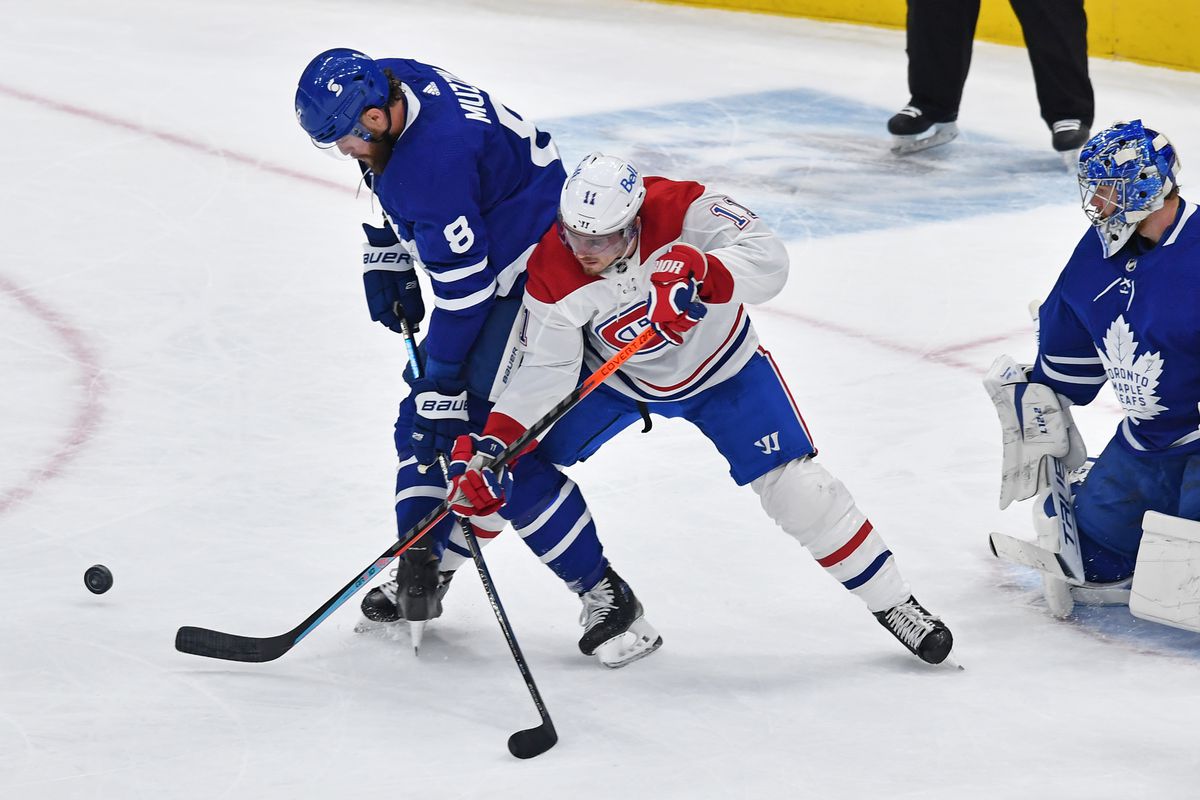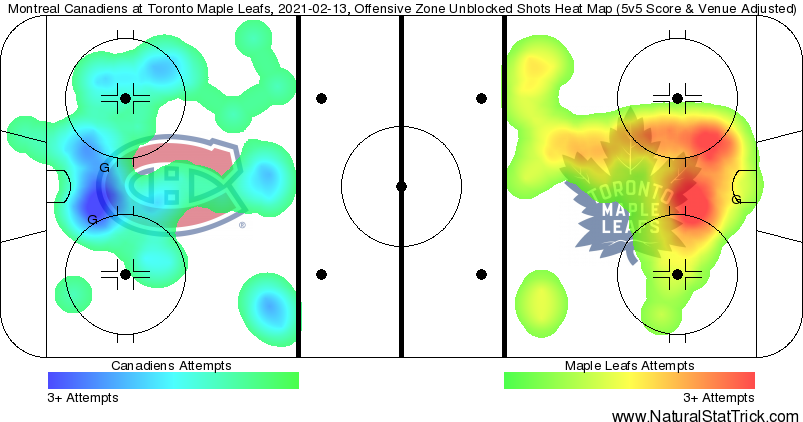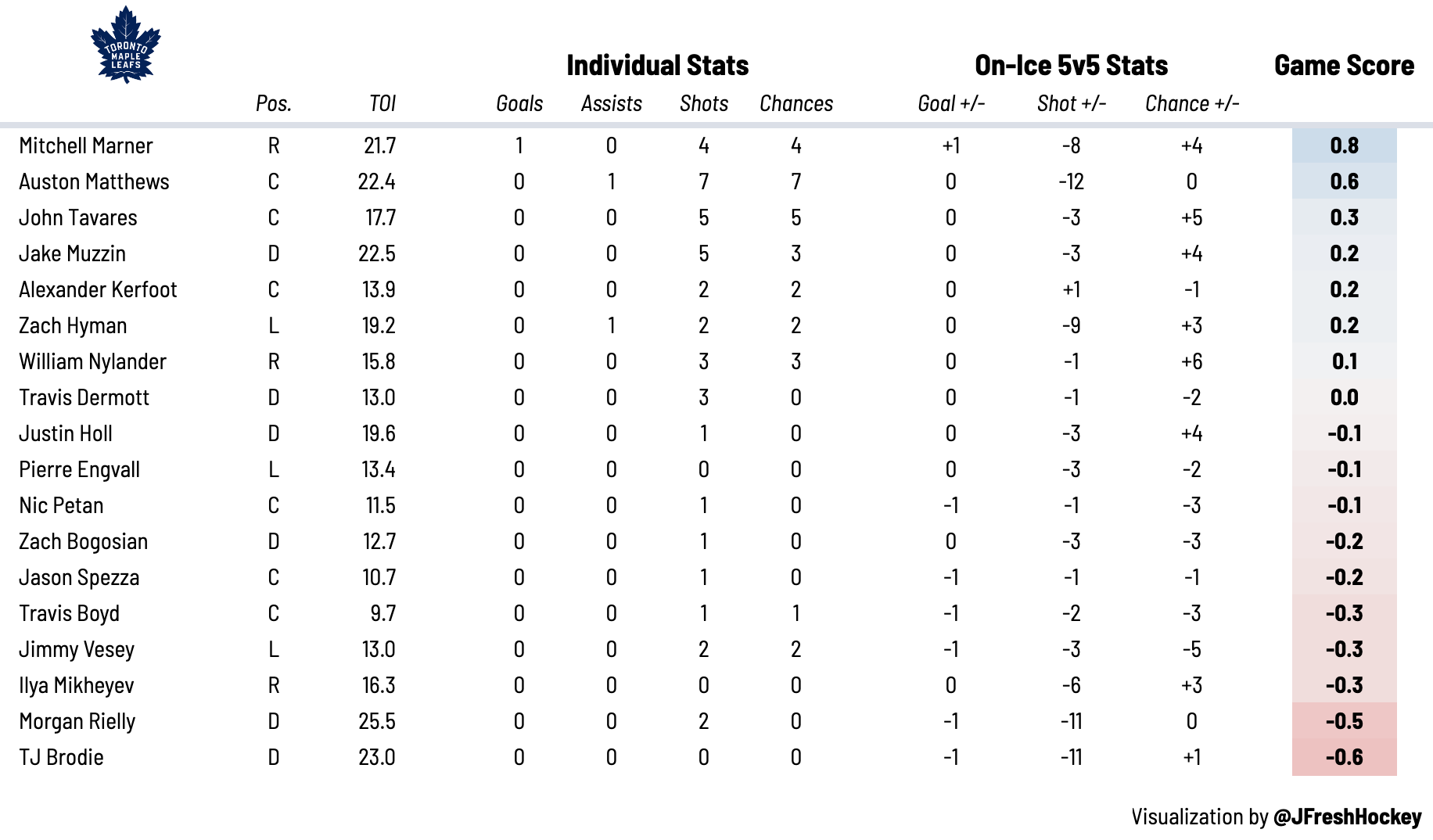That’s a tough way to lose.
After getting out to an early 1-0 lead that easily could’ve been a multi-goal lead, the Toronto Maple Leafs lost their momentum and never found it again. Montreal came out hungry in the third, dominating the run of play. The Canadiens didn’t let their foot off the gas, ultimately winning the game 2-1 with a late goal by Brendan Gallagher.
Sheldon Keefe summed the game up accurately in a few sentences after the loss:
Sheldon Keefe: "We had more than enough offence there in the first to blow this game wide open, and didn't capitalize; it didn't go our way. And then our game was a mess from there."
— Kristen Shilton (@kristen_shilton) February 14, 2021
This wasn’t the most exciting hockey game, but considering we got to watch the two best teams in the Canadian Division, I’m sure there are a few things we can take out of tonight. Let’s start by evaluating each player individually.
5/5 Stars
Game Puck: Auston Matthews (C, #34) — He was an absolute puck-hound in this game, using his stick to win back pucks for his team in all three zones. That’s how he created Toronto’s only goal of the game; by stripping the puck loose behind Montreal’s net and finding Mitch Marner alone in the slot.
Making magic 🪄#LeafsForever pic.twitter.com/rgT2w1VklX
— Toronto Maple Leafs (@MapleLeafs) February 14, 2021
Matthews also had a brilliant takeaway in the defensive zone against Nick Suzuki. We’ve been hearing a lot of talk about how #34 has been the Leafs‘ true captain this season, leading by example with his 200-foot effort every night. A few bobbles late in the game with the goalie pulled aside, Saturday night was no different.
4/5 Stars
Mitch Marner (RW, #16) — The first period of this game was the Matthews-Marner Show. Matthews was threading no-look passes to Marner, who was able to corral them and generate some quality looks from the slot.
The two were also able to connect on that trademark PP seam pass through the middle of the ice. With Matthews being so good at catching pucks, Marner was able to slap-pass it onto his tape, leading to a quick wrister that almost beat Carey Price.
It’s also worth noting Marner’s impact on the game defensively, especially when you consider he spends most of his shifts alongside Morgan Rielly. With the Leafs‘ active defenseman jumping up into the play all the time, it’s often Marner skating back full-speed to prevent any odd-man rushes the other way.
Jake Muzzin (LD, #8) — The plays he makes defensively are so subtle throughout the course of a hockey game, yet so impactful. For example, getting his stick on a puck in the neutral zone might not seem like much, but then you realize that play would’ve resulted in a 2-on-1 had it not been for the poke check.
He makes plays like these all the time, which is why the Leafs trust him so much defensively. It doesn’t always stand out to you (i.e. his play tonight), but sometimes it’s the little things that make a big difference.
The 3rd Pair — The combination of Travis Dermott and Zach Bogosian seems to be working well at even strength. Dermott’s “escapability” helps that pairing start the breakout, while Bogosian’s solid defensive play in front of the net helps prevent dangerous chances.
Zach Bogosian has had a pretty solid game tonight by my eye.
It’s just, he handles the puck like he has two broken wrists and both of his arms are in casts
— Rhys Jessop (@Thats_Offside) February 14, 2021
That’s an accurate assessment. As fun as it is to watch Bogosian activate in the play, maybe leave more of that to Dermott.
3/5 Stars
Frederik Andersen (G, #31) — He didn’t have to face too many dangerous shots early on, but as we mentioned, the Canadiens started to pour on the pressure in the back-half of the game. Andersen made a few key saves, most memorably a rebound stop on Tyler Toffoli at the side of the net.
Unfortunately, it wasn’t enough to secure the victory. Then again, you’re not going to win many games with minimal goal support.
Morgan Rielly (LD, #44) — This is a tough one to evaluate for me. I loved Rielly’s offensive impact early in the game. His motion in the offensive zone gave Montreal’s defense a headache, opening up passing and shooting lanes for Toronto.
Later on, Rielly wasn’t moving his feet as much, especially on the defensive side of things. He was losing puck races to his corner, which resulted in his pairing getting hemmed in quite a bit in the back half of the game.
TJ Brodie (RD, #78) — Similarly, Brodie had some big ups and downs in this game. He broke up another 2-on-1 pass by getting his stick in the right position defensively. At this point, I think it’s fair to say he’s the Leafs‘ best defenseman at taking away those passes through the middle of the ice, especially on 2-on-1s.
Then, with 3:06 remaining in the third period, Brodie got outmuscled in front of the net by Gallagher.
Tables: turned. 😏#GoHabsGo pic.twitter.com/a1RuqxsSoD
— Canadiens Montréal (@CanadiensMTL) February 14, 2021
I never love overreacting to one “Big Mistake” by a defenseman, but that one really stings.
Zach Hyman (LW, #11) — It’s been interesting to watch the development of Hyman’s game skill-wise. He never had the greatest set of mitts, but we’re starting to see him complete more passes off the rush to get his talented linemates into open ice.
He does it in typical Zach Hyman fashion; by frantically getting his body on the defender, boxing them out, and poking the puck to an open teammate. He did it against Shea Weber a couple times, which isn’t the easiest feat.
2/5 Stars
Tavares-Nylander — I liked Tavares defensively in this game. He broke up a few plays off the rush by getting his stick in the passing lane. Offensively, I find myself disagreeing with the numbers. The box score will tell you that Tavares generated five scoring chances, but when you watch that line closely night after night, it hasn’t felt dangerous in a while.
Part of that could be bad luck. After all, Tavares is shooting 3.6 percent at even strength this season. That’s going to regress (upwards) in a big way sometime soon.
Speaking of bad luck, William Nylander set up Alex Kerfoot with a backdoor pass that hit the post, followed by a shot from Nylander in the slot that hit the post. Evaluating his game as a whole, though, #88 looked disengaged for the majority of Saturday night’s game.
We know both of these guys are excellent hockey players, but for whatever reason, their line hasn’t been clicking lately.
Ilya Mikheyev (RW, #65) — For any basketball fans out there, he’s starting to remind me of Tony Allen back in the Grit N Grind Memphis Grizzlies days. Allen was a defensive specialist who provided little value offensively.
Mikheyev is always someone you can trust defensively and he never shortchanges you on effort, but when you’re playing alongside Tavares-Nylander and can’t even register a shot attempt, that’s a problem.
The 4th Line — As much as I love Nic Petan‘s ability to thread saucer passes, I can understand why NHL coaches have never trusted him considering how many board battles he loses. Travis Boyd is still looking to make those drop passes off the rush, but he wasn’t able to create any quality chances in this game. Jason Spezza looked a bit off, too. Some of his passes were clicking, but we’ve seen him play much better offensively than tonight.
Justin Holl (RD, #3) — I’m a big Justin Holl fan, but I didn’t think this was his best game. He seemed to be fighting the puck a bit early on, struggling to complete passes up the ice. Holl was at his best when he was activating down the right wall to keep play alive in the offensive zone.
He was at his worst on Toffoli’s tying goal.
Quel jeu de passe pour le 10e de la saison de Toffoli! 🤩
What a passing play on Toffoli's 10th of the season!#GoHabsGo pic.twitter.com/Rnp4c75HA2
— Canadiens Montréal (@CanadiensMTL) February 14, 2021
It’s never fair to blame one player for a goal against. There’s usually a combination of factors leading to the breakdown; Gallagher winning the loose puck race; Travis Boyd overskating the puck.
That said, you’d like to see Holl prevent that pass through the middle of the ice.
1/5 Stars
The Third Line — The Alex Kerfoot Problem is real. Every so often he’ll use his speed to transport the puck up the ice, but otherwise, it’s hard to find ways he’s positively impacting the game. Jimmy Vesey‘s best play of the night was a strong backcheck to prevent a Montreal chance from the slot. His most memorable play was falling over in the offensive zone after a pass from Rielly, which was a funny little microcosm of his time this season for Toronto. Pierre Engvall is helping his linemates gain the zone with his speed, but there isn’t much value to that if you’re chipping the puck in the corner after two strides.
Heat Map
Here’s a quick look at where each team’s shots were coming from at even strength, courtesy of Natural Stat Trick.
Here’s a fun breakdown of Toronto’s shot share (CF%) at even strength.
- 1st Period: 50%
- 2nd Period: 45%
- 3rd Period: 34%
Wait, that wasn’t very fun.
Game Score
Game score is a metric developed by The Athletic’s Dom Luszczyszyn to measure single-game performance. You can read more about it here.




































